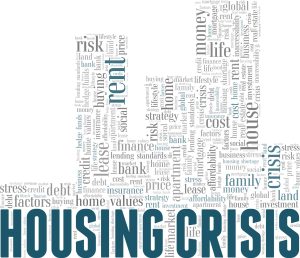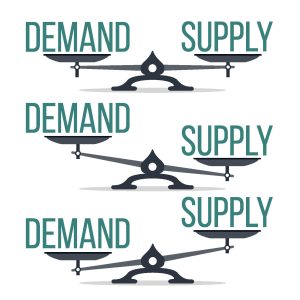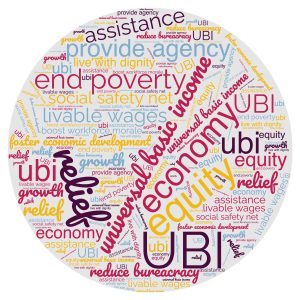 The Guelph housing crisis is hardly new. In fact, it’s been brewing for a number of years. Finding our way out of this complex issue is going to require us to get serious – and creative – about tackling it.
The Guelph housing crisis is hardly new. In fact, it’s been brewing for a number of years. Finding our way out of this complex issue is going to require us to get serious – and creative – about tackling it.
In Guelph and in most cities, the time has come to stop pretending that we will “new build” our way out of the housing crisis. This is a profoundly complex issue, but we continue to have politicians and members of the business community who make it sound as the path out of this is just as simple as adding more “supply” to the market.
Look, of course inadequate housing supply is a huge part of the problem. In Guelph, we do not have enough housing to meet the demand of buyers or renters. Let me be more specific: We do not have enough affordable housing to meet their demands.
New construction proposals offer a glimmer of hope, but unless they include affordable housing elements and are solely going to be owner-occupied, I think you’ll find that new builds will have little or no impact on solving the housing crisis. Do I think that increased supply will lower the overall price of real estate in Guelph? No – and I can’t find a single example of a comparable market where a bunch of (market value) new builds has directly led to lower house prices. The “increase supply to meet the demand and prices will drop” argument is, in my opinion, a myth.
I’m not a politician. I’m not an expert in municipal politics. But I think there are lot of ways to come at the Guelph housing crisis – and we need to be open to exploring each and every one of these ideas. I will tackle each of these points in further detail in future blog posts, but here’s an overview. Well, maybe more like a brain dump.
1. Increase the Supply of Affordable Housing
I know. It’s painfully obvious. Still, we get politicians and members of the business community (the latter of whom who usually have “skin in the game,” by the way) telling us that supply alone will provide some relief. I don’t think so. It has to be the right kind of supply.
Luxurious high-rise condo units and market-value homes or townhomes are all fine and dandy. But none of these proposed developments even come close to meeting the City of Guelph’s definition of affordable housing.
Do I expect home builders to operate at a loss or even a break-even? No! They are businesses not charitable organizations. They have a right to profit from their expertise and hard work. But as residents, should we be mobilizing to demand that any and all levels of government properly incentivize developers to build affordable housing units? Yes, we should. Our government – all levels of it – needs to step up and help developers help people.
2. Fund Housing Assistance Programs
Somehow, we’ve managed to become a society where the process of buying a house has become unbearably challenging – even for people who are gainfully employed with perfect credit. For those with a credit blip or who don’t post significant income, home ownership seems like an impossibility.
We need to ask leaders in all levels of government to fund housing assistance programs. What kind of down-payment assistance could be offered to medium and lower-income households? So often, people with good jobs and great credit are stuck in the rent trap… simply because they cannot afford a huge lump sum for a down payment. Can our elected officials get creative and devise new programs and subsidies? I’m sure they could – if they tried.
3. Update Zoning and Land-use Policies
It’s time for a hard look at local zoning and land-use policies. If you talk to Guelph homeowners, developers, and people in the trades, what you’ll hear is a never-ending loop of tales regarding exactly how difficult the City of Guelph is to work with when you try to create infill. Contractors who literally won’t take on projects that require permits. Trades that buy their lumber in neighbouring cities, because of incidents where City staff has followed them from a local lumber yard to a job site. Our municipal leaders can say that the notorious “Guelph Factor” doesn’t exist until they are blue in the face. Many residents and tradespeople in this city feel differently.
It’s time to look at any and all policies exist that make it cumbersome and/or cost prohibitive to do things like:
- Duplex or Triplex an existing property (oh, sorry – you can’t triplex a property in Guelph!)
- Build affordable housing;
- Sever a property for purposes of creating a new lot for infill;
- Rezone commercial or industrial properties to residential;
- and so forth.
If we really want to encourage new growth and infill, let’s make it less daunting and less expensive for citizens and developers to do so.
4. Increase Wages and Consider UBI
Recently, I saw a Twitter exchange between our Mayor and a resident. The Mayor was (quite rightfully) raising awareness of the housing crisis, and expressing concern over how many people were leaving Guelph due to affordability concerns.
A resident responded that good-paying jobs were few and far between here, from his experience. He noted that Guelph’s largest employer starts workers about $2 over minimum wage. This bothered the Mayor, who felt it was unfair to attack the company in such a way.
But… hang on a second. Yes, being a large employer is absolutely worthy of praise and gratitude. At the same time, I think it’s fair game to point out when any employer fails to offer employees a livable wage – especially in a city where rents have skyrocketed to absurdly-high levels and home ownership remains out of reach for so many.
Not all ways of tackling the housing crisis actually involve housing or development. As residents and as consumers, we need to start making noise about livable wages. Oh, I can already hear the right-leaning corporate apologists saying that it’s simply not possible and businesses can’t afford it. It’s true; they can’t afford it if they don’t change. But perhaps the time has come to push large employers to adjust their compensation models. How many claim they cannot pay front-line workers a livable wage, while paying their executive teams millions of dollars a year? Perhaps they have the funds – they’re just not distributing them in a balanced and equitable way.
Next up, how about some serious debate around Universal Basic Income (UBI?)
So many can’t get past the “I wasn’t given a handout, so why should they” part of this conversation. Could we just push aside the debate around whether or not it’s “fair” and ask ourselves: Does it make financial sense? Honestly, if the math shows us that UBI makes fiscal sense, we should seriously consider it. Hell, we should just do it. One thing I am certain of is that, for a great many people, UBI could be an absolute game-changer in many ways – including buying or renting.
5. Demand Change for Rental Properties
I think there are a few pieces to the housing crisis that specifically pertain to rental properties.
The first two involve new builds that are so often being snapped up by cash-rich investor buyers who have no intent to own-occupy. Because the Ford Administration removed rental controls from new housing units, these investor owners become landlords who can charge whatever they want – and raise rates as high as they want.
 So, two things. First, we can and we should ask our elected officials to work together to get consumer rental protections returned. Second, and perhaps more importantly, is it time to put a moratorium on investor-buying for new housing supply? New housing supply would, then, be strictly open to those who need a property for themselves or an immediate family member.
So, two things. First, we can and we should ask our elected officials to work together to get consumer rental protections returned. Second, and perhaps more importantly, is it time to put a moratorium on investor-buying for new housing supply? New housing supply would, then, be strictly open to those who need a property for themselves or an immediate family member.
How would that work? I guess we’d need to require Buyers to make an attestation that they (or an immediate family member) would be occupying the home for “x” number of years? What would that look like and how would it be enforced… I don’t know. But has the time come to put a lid on investor buying of new builds? I wonder.
The other aspect of the rental crisis that needs a serious look is the Residential Tenancies Act itself. Frankly, it’s time for some sweeping changes. Many years ago, consumer protections for renters were terrible – nonexistent, really. Change was needed – but the pendulum swung too far. Now, we have a series of rules and regulations that frankly are so skewed in favour of tenants that many people (who might otherwise duplex a house and become landlords) want nothing to do with it. The Act needs an overhaul. As for hearings and resolutions on landlord-tenant disputes, we’re something around a year of waiting on these, last I checked. Ridiculous. Hearings and resolutions should be streamlined.
6. Support Community Land Trusts
I’ve been reading a lot lately about Community Land Trusts. Honestly, I didn’t know much about them. These are nonprofit organizations that acquire land and develop affordable housing with a goal to ensure that it remains affordable for future generations. I’ve been reading about CLTs in different urban markets and wonder if we will start to see this in the Guelph area.
This is a great example of the “long game” in tackling the Guelph housing crisis. It does provide some relief in the short term but the real impact of these Trusts will be felt in the years ahead.
7. Confront NIMBY
Guelph is no exception to the NIMBY problem. So many opine on social media or in “real life” about the need for infill and affordable housing – yet balk as soon as those projects start to get a little too close for comfort.
 Obvious examples are high-rise developments that have the potential to block or otherwise impair someone’s view. I get it, but building up is a critical part of battling the Guelph housing crisis. Should those buildings include affordable and accessible units? Absolutely. These have to be part of new developments, period. But simply saying, “we don’t want tall buildings” strikes me as the very definition of NIMBY. We must be honest with ourselves about our own biases and fears, and we must adapt.
Obvious examples are high-rise developments that have the potential to block or otherwise impair someone’s view. I get it, but building up is a critical part of battling the Guelph housing crisis. Should those buildings include affordable and accessible units? Absolutely. These have to be part of new developments, period. But simply saying, “we don’t want tall buildings” strikes me as the very definition of NIMBY. We must be honest with ourselves about our own biases and fears, and we must adapt.
I see particular NIMBY challenges around things like secondary dwellings or ‘tiny houses’ as well as severing large lots. In many cases, the homes with lots that are large enough to allow for these infill initiatives are often located in expensive parts of town (Kortright East, Kortright Hills, and Old University come to mind – to name but a few.)
Plenty of the residents in these neighbourhoods agree that we need housing solutions. But do they want their neighbour to plop a secondary dwelling in their backyard? Probably not.
Rather than just blast people for the whole NIMBY thing, and try to shame people into changing – how about we try to have honest, open and judgement-free discussions about it. Look, we could all have a NIMBY reaction to a proposed development, if the circumstances were right. Sometimes, people just want and need to be heard – so let’s hear them. We might even come up with solutions to help to alleviate concerns which – in some cases – may be very valid. An example, privacy will be impacted – could the City offer a variance for higher fencing, or a tax credit to account for tree plantings. (I’m spitballing, obviously.)
8. Real Estate Reform
I’ve long believed that we need reform and a great deal more transparency in real estate transactions. Did Realtors “cause” the insanity of the early 2022 housing peak in Guelph? No, but our industry contributed significantly to what was, by any logical measure, a completely out-of-control and nonsensical market.
If, for example, we’d had an open and transparent system for bidding during multiple offers – do you really think homes would have sold for $100-$150k over asking? I don’t. In some cases, offers were coming in with spreads of $50,000 or more between the highest and second-highest offers. I “get” why home owners want this, but to me it’s so consumer-hostile.
In the end, 2022’s real estate fall was as dramatic as its rise. Many homes didn’t appraise out, plenty of transactions didn’t close, lawsuits are underway. People lost their deposits, and many who bought at the peak now feel the sting of buyer’s remorse, knowing their property today is worth a fraction of what they paid for it a year ago. What a mess.
Reform has been needed for some time, and it’s coming this year. It will be interesting to see what’s changing – and what’s remaining the status quo.
In Summary – Housing Crisis Solutions
Do I have all of the answers? Clearly not.
What I do have, and what I hope others have, is a desire to tackle the Guelph housing crisis in a way that gets us beyond the “we just need more units in the market” narrative.
So let’s dig deeper and talk further. If we can put together a multifaceted approach with collaboration between policymakers, developers, community organizations, and other stakeholders, we might just get ahead of this thing.







